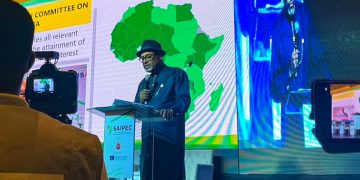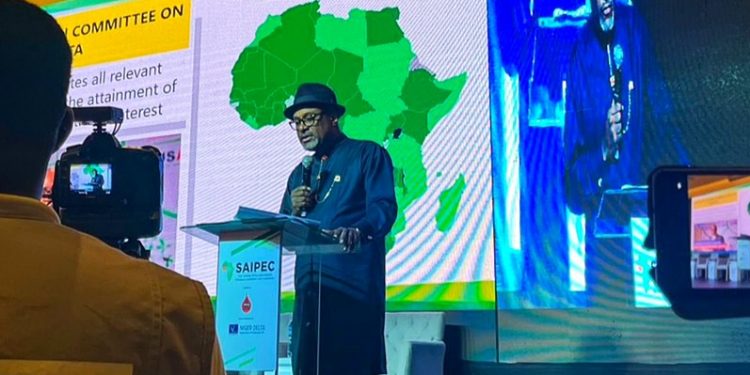By John Ikani
The Nigerian Content Development and Monitoring Board (NCDMB) has stressed the need to leverage the African Continental Free Trade Agreement (AfCFTA) to facilitate a collaborative local content strategy in Africa.
The emphasis was made by the Executive Secretary of the Board, Engr. Simbi Wabote on Tuesday while delivering his keynote address at the 7th edition of the Sub-Saharan Africa International Petroleum Exhibition and Conference (SAIPEC) with the theme “Sub-Saharan Africa Local Content Collaboration Strategies”.
According to Wabote, the AfCFTA integrates 1.3 billion people across 54 African countries, creating the world’s largest free trade area and tapping into a combined Gross Domestic Product (GDP) of over 3 trillion dollars.
He explained that the AfCTA can be leveraged on to facilitate a collaborative local content strategy in Africa with objectives that include breaking down barriers, encouraging cross-border collaboration between governments and businesses, and promoting peer review mechanisms to share experiences and ideas on industry growth and sustainability.
For the strategy to be successful, Wabote emphasized the importance of addressing issues such as legal frameworks, funding, infrastructure, human capacity development, and research and development.
He commended the foresight of the League of African Leaders who adopted AfCFTA in 2012 at the 18th Ordinary Session of the Assembly of Heads of State and Government of the African Union (AU) in Addis Ababa, Ethiopia.
Wabote also recognized the potential for investment in infrastructure to have a significant impact on economic growth.
Citing a 2020 study by GI Hub, he noted that the economic multiplier for public investment, including infrastructure, was one and a half times greater than the initial investment in two to five years.
The Dangote Integrated Refinery and Petrochemical Company, expected to come on stream this year with an installed capacity of 650,000 barrels per day, will offer partnership opportunities for sourcing petroleum products and fertiliser for Nigeria and other African countries.
The Lekki Free Zone and facilities such as the SHI-MCI FPSO Fabrication/ Integration in Lagos also present opportunities for collaboration in the construction of FPSO and other offshore oil and gas facilities.
Wabote encouraged collaboration among African countries by taking advantage of infrastructure such as the West Africa Gas Pipeline (WAGP) and the ongoing AKK gas transmission infrastructure to serve regional and African markets.
He added that the developmental strategies for roads, gas pipelines, fibre-optic cables, railways, and other infrastructure across the continent should start from a cluster within a country and grow organically across borders.
Wabote also announced that the Board is developing infrastructure across seven locations in Nigeria to provide manufacturing components to serve local and regional markets collaboratively.
He invited businesses and investors interested in manufacturing in any of these industrial parks to contact the Board for the allocation of plots for development.



































